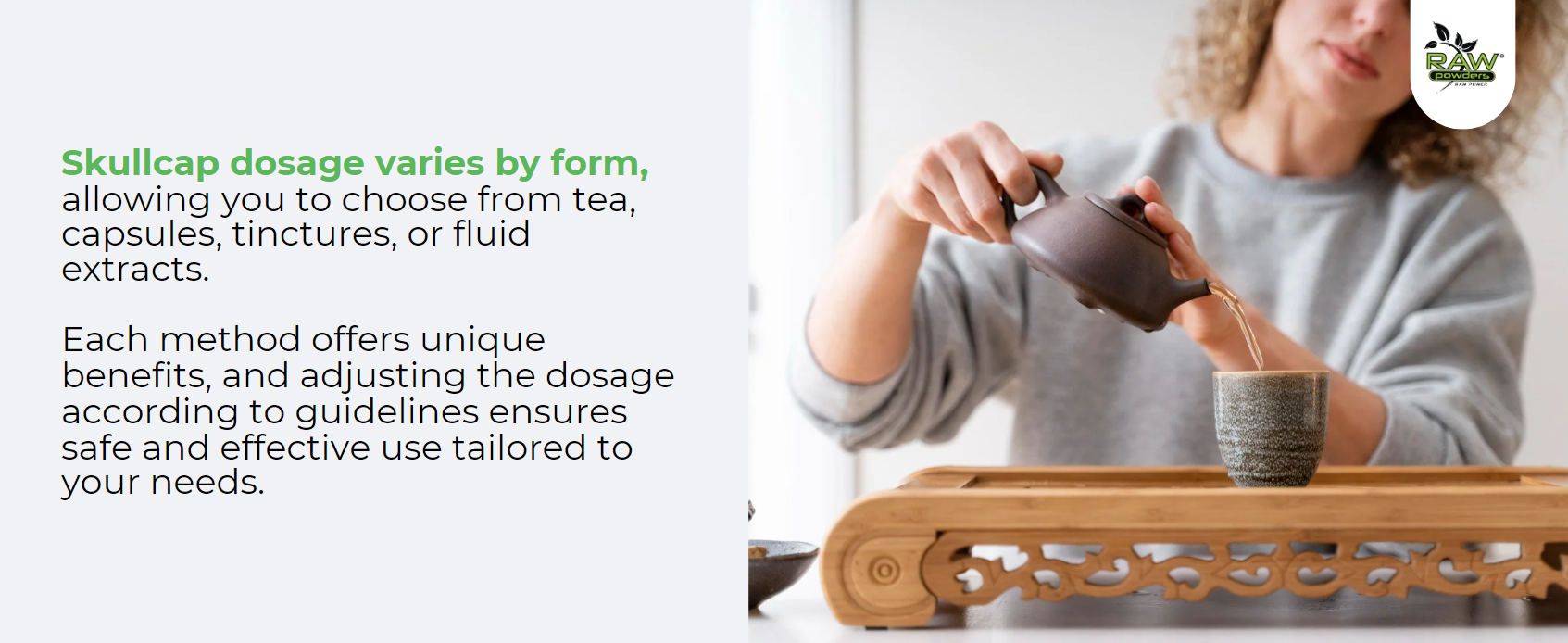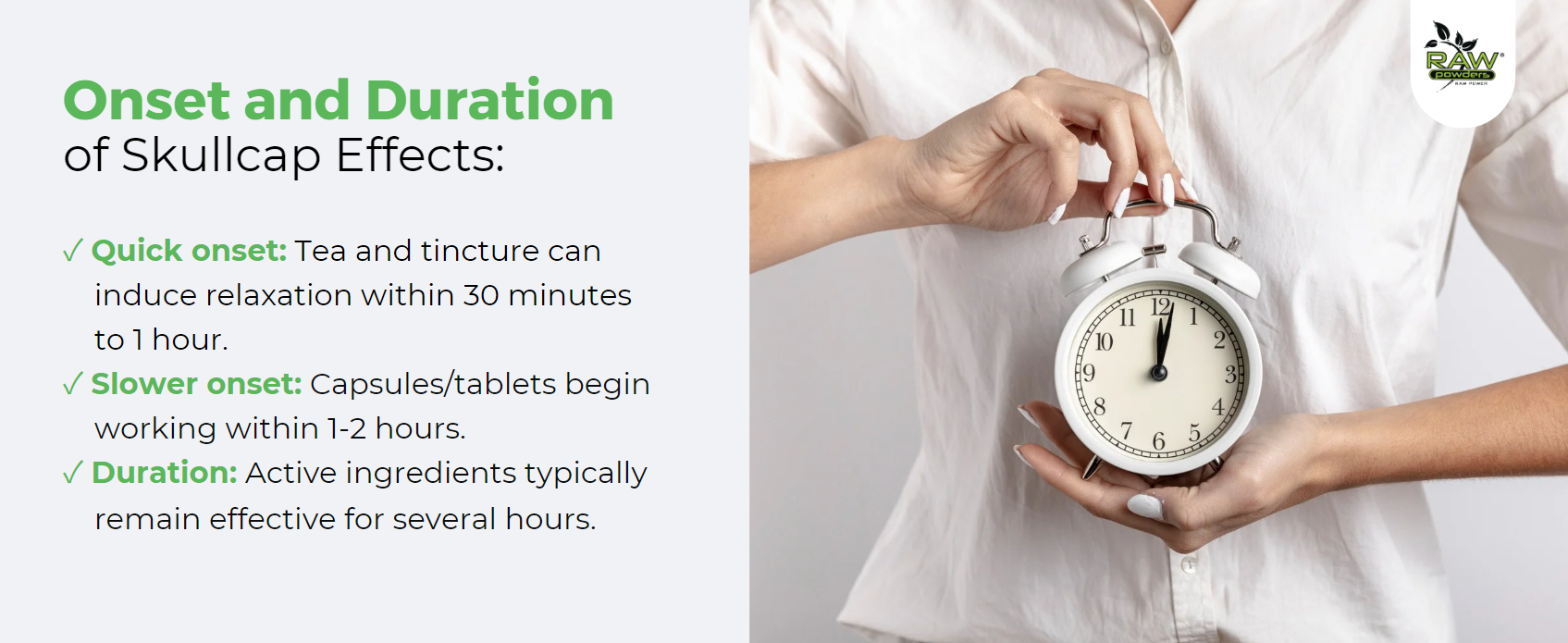DOSAGE OF SKULLCAP: A COMPREHENSIVE GUIDE


Skullcap dosage is crucial for ensuring safe and effective use of this herbal supplement. In this article you will learn about Skullcap dosage, duration of action and factors affecting dosage.

Skullcap Dosage: Different Forms and Recommended Amounts
The dosage of skullcap varies depending on its form:
- Skullcap Tea: Made by steeping 1 to 2 teaspoons of dried skullcap in boiling water for 10 to 15 minutes, this tea can be consumed up to three times daily. Skullcap tea has a subtle, earthy taste with a hint of bitterness.
- Capsules/Tablets: The concentration of skullcap in these forms can vary, so it's important to follow the manufacturer's instructions. Skullcap capsules and tablets offer a convenient and controlled route of administration.
- Tinctures: An alcoholic liquid, usually taken in doses of 1 to 2 ml three times a day. The concentration in tinctures can vary, so always check the product label.
- Fluid Extracts: These are more potent than tinctures and typically taken in 1 to 2 ml doses up to three times a day.

Usage and Effectiveness
How Long Does Skullcap Take to Work?
The effectiveness of skullcap and the speed at which it begins to work can significantly vary based on the form in which it is consumed. When ingested as tea or tincture, skullcap is known to exhibit its calming effects relatively quickly. Typically, users may begin to feel more relaxed or notice a decrease in anxiety symptoms within 30 minutes to an hour after consumption. This faster onset is attributed to the direct absorption of the active compounds into the bloodstream.
In contrast, when skullcap is taken in capsule or tablet form, the onset of its effects might be slower. This delay is mainly due to the digestion process, as the capsules or tablets need to be broken down in the digestive tract before the skullcap can be absorbed. Usually, it might take anywhere from one to two hours for the user to start noticing the benefits. (You can read more about the benefits of Skullcap supplements in the blog - Skullcap Benefits.) This slower onset, however, can also mean a more sustained release of the herb's active components, potentially offering prolonged effects. It was shown in one study that Baicalein (one of the main flavonoids of Skullcap) tablets within the studied dose range (200 mg, 400 mg, 600 mg, or 800 mg) were safe and well-tolerated in healthy Chinese subjects with no serious or severe adverse effects.The exposure of baicalein and its metabolites increased in a less than dose-proportional manner [1].
Duration in the Body
The duration for which skullcap's active ingredients stay in the body is another important aspect to consider. Generally, the compounds in skullcap can be expected to remain active in the system for a few hours, providing a period of relief from symptoms like anxiety or insomnia. However, this duration is not uniform and can vary significantly among individuals.
The pharmacokinetics and metabolic pathways of Scutellaria's active ingredients, such as scutellarin, are crucial to understanding how long these compounds stay active in the body. One key study that specifically addresses the metabolism and pharmacokinetics of scutellarin in humans after a single oral administration reveals the intricate process through which scutellarin is absorbed, metabolized, and excreted. According to this study, scutellarin undergoes rapid metabolism, resulting in very low plasma concentrations of the parent compound, but comparatively high concentrations of its major metabolite, scutellarein 6-O-β-d-glucuronide. The peak plasma concentration of the major metabolite was reached late, suggesting a prolonged period of activity in the body. This finding indicates that while the parent compound may be quickly metabolized, its active metabolites could contribute to the therapeutic effects over a few hours. The study also highlighted the possibility of scutellarin absorption into the intestine after hydrolysis to its aglycone by bacterial enzymes, followed by reconjugation in the intestinal cell and/or liver, which could affect the duration of its activity in the system [2].
Several factors influence how long skullcap stays effective in the body. Metabolism plays a crucial role; individuals with a faster metabolism may process and eliminate the compounds more quickly than those with a slower metabolism. Similarly, the dosage taken also impacts duration. Higher doses may result in a longer duration of effect, but they also increase the risk of side effects.
For more information on the possible side effects of Skullcap, see the blog - Skullcap side effects.
Furthermore, the form of skullcap used also matters. Fluid extracts and tinctures, being more concentrated, may stay active in the body for a longer period compared to tea or capsules. It's also worth noting that the method of preparation, particularly for tea, can affect the concentration of active ingredients, thereby influencing both the onset and duration of effects.
Understanding these aspects of skullcap's usage and effectiveness is crucial for anyone looking to use this herb for its therapeutic benefits. It underscores the importance of considering individual factors like metabolism and lifestyle, as well as the specific form and dosage of skullcap used, to achieve the desired effects safely and effectively.
Given the absence of direct evidence from the studies provided, it remains critical for further research to explicitly investigate the pharmacokinetics of skullcap's active compounds to better understand their duration of action in the human body. This would provide a more informed basis for recommending dosages and understanding how long the compounds provide therapeutic effects after consumption.

Factors Influencing Dosage
When it comes to using skullcap effectively and safely, understanding the factors that influence its dosage is essential. The right amount of skullcap for an individual can vary greatly due to several personal factors. Here's a closer look at these key determinants:
1. Age: Age is a critical factor in determining the appropriate dosage of skullcap. Generally, older adults may require a lower dose as their metabolism tends to be slower, affecting how the body processes and eliminates the herb. Similarly, for children, who metabolize substances differently than adults, a much lower dose is recommended, if at all. It's essential to consult a pediatrician before giving a skullcap to children.
2. Weight: Body weight plays a significant role in how much skullcap one should take. People with higher body weight may require a larger dose for the herb to be effective, while those with a lower body weight may need less. This variation is due to the distribution of the herb's compounds in the body.
3. Overall Health: The general health condition of an individual can impact how skullcap affects them. For instance, those with liver or kidney issues may need to adjust the dosage, as these organs are vital in processing and eliminating substances from the body. Additionally, the presence of chronic conditions may influence how the body responds to Skullcap.
4. Existing Medical Conditions: Certain medical conditions can contraindicate the use of skullcap or necessitate a modified dosage. For example, individuals with conditions like epilepsy, Parkinson's disease, or other neurological disorders should use skullcap cautiously, as it may interact with their existing treatments or affect their condition.

5. Concurrent Use of Other Medications: The interaction of skullcap with other medications is a crucial consideration. Skullcap can interact with sedatives, blood thinners, and other herbal supplements, potentially leading to adverse effects. It's important to disclose all current medications to a healthcare provider before starting skullcap.
6. Personal Tolerance and Sensitivity: Individual tolerance and sensitivity levels can vary widely. Some people may be more sensitive to herbal remedies and require a smaller dose, while others might need a higher dose to achieve the same effect.
Given these variables, it's clear that a "one size fits all" approach doesn't work for determining the right dosage of skullcap. It's always advisable to start with the lowest possible dose and gradually increase it under the guidance of a healthcare provider. This personalized approach ensures not only the efficacy of the herb but also its safety, minimizing the risk of side effects and interactions with other medications. Consulting with a healthcare professional is the best way to determine a dosage that is both safe and effective for your individual needs, as well as it is vital before starting any new supplement, including skullcap. They can provide guidance on safe usage, potential interactions with other medications, and help monitor its efficacy and safety.
Skullcap, with its rich history in herbal medicine, offers various potential health benefits. However, understanding the correct dosage, how it works, and how long it stays in the system is key to using it effectively and safely. Always seek professional guidance to ensure the best outcomes.
Medical Disclaimer
The information provided in our articles is solely for educational purposes and should not be considered medical advice or instruction. No action or inaction should be taken based solely on the contents of this information. Readers should consult their health care professional on any matter related to their health and well-being. The information and opinions provided here are believed to be accurate and sound, based on the best judgment available to the authors, but readers who fail to consult with appropriate health authorities assume the risk of any injuries. The publisher is not responsible for errors or omissions.
Please be aware that different countries may have specific regulations and that this disclaimer does not replace the need for consultation with a healthcare provider before beginning or changing a treatment or supplement regimen. The information contained in this article is not intended to diagnose, treat, cure, or prevent any disease. Individual results may vary.
References
- Ruihua Dong, Lijun Li, Hongzhi Gao, Kun Lou, Hongmei Luo, Sheng Hao, Jing Yuan, Zeyuan Liu. Safety, tolerability, pharmacokinetics, and food effect of baicalein tablets in healthy Chinese subjects: A single-center, randomized, double-blind, placebo-controlled, single-dose phase I study. Clinical Trial: J Ethnopharmacol. 2021 Jun 28:274:114052. doi: 10.1016/j.jep.2021.114052. Epub 2021 Mar 19. PMID: 33753147. https://pubmed.ncbi.nlm.nih.gov/33753147/
- Chen, X., Cui, L., Duan, X., Ma, B., & Zhong, D. (2006). PHARMACOKINETICS AND METABOLISM OF THE FLAVONOID SCUTELLARIN IN HUMANS AFTER A SINGLE ORAL ADMINISTRATION. Drug Metabolism and Disposition, 34, 1345 - 1352. doi: 10.1124/dmd.106.009779. https://dmd.aspetjournals.org/content/34/8/1345





_front%20(1)-250x250.png)



_front%20(1)-250x250.png)

-(NN)_front%20(1)-min-250x250.png)

_front%20(1)-250x250.png)


_front%20(1)-min-250x250.png)
_front%20(1)%20(1)-250x250.png)
_front%20(1)%20(1)-250x250.png)
_front%20(1)-min-250x250.png)
_front%20(1)-min-250x250.png)
_front%20(1)%20(1)-250x250.png)
_front%20(1)%20(1)-250x250.png)

